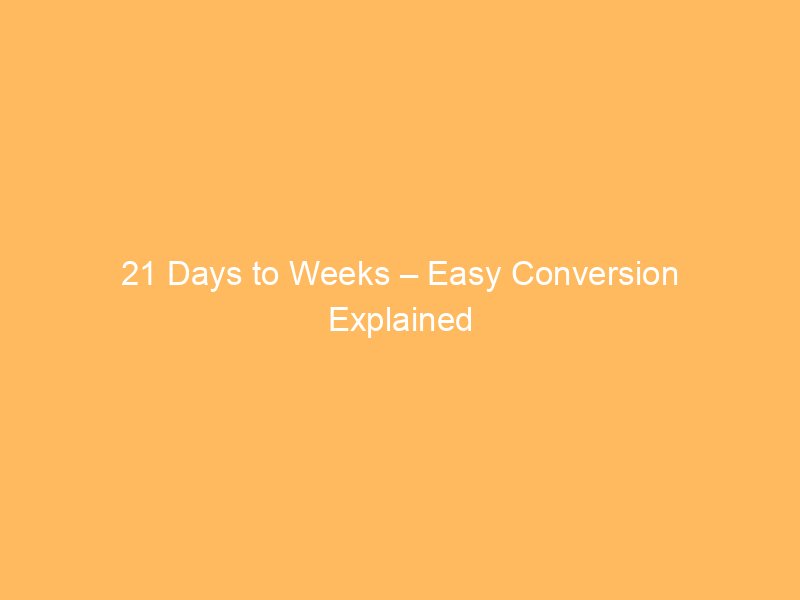21 days equals 3 weeks.
Since 1 week contains 7 days, dividing 21 by 7 gives the number of weeks. So, 21 days divided by 7 days per week results in 3 weeks.
Conversion Tool
Result in weeks:
Conversion Formula
To convert days into weeks, divide the number of days by 7. This works because a week always has 7 days, no matter the context or calendar.
Formula:
Weeks = Days ÷ 7
Example calculation for 21 days:
- Step 1: Identify number of days (21 days)
- Step 2: Divide by 7 (since 1 week = 7 days)
- Step 3: 21 ÷ 7 = 3
- Result: 21 days equals 3 weeks
Conversion Example
- 35 days to weeks:
- Divide 35 by 7
- 35 ÷ 7 = 5
- Answer: 35 days is 5 weeks
- 10 days to weeks:
- 10 ÷ 7 = 1.4286
- This means 10 days is approximately 1.43 weeks
- 50 days to weeks:
- 50 ÷ 7 = 7.1429
- 50 days equals about 7.14 weeks
- 3 days to weeks:
- 3 ÷ 7 = 0.4286
- So, 3 days is roughly 0.43 weeks
Conversion Chart
| Days | Weeks |
|---|---|
| -4.0 | -0.5714 |
| 0.0 | 0.0000 |
| 7.0 | 1.0000 |
| 14.0 | 2.0000 |
| 21.0 | 3.0000 |
| 28.0 | 4.0000 |
| 35.0 | 5.0000 |
| 42.0 | 6.0000 |
| 46.0 | 6.5714 |
The chart displays days on the left and their equivalent weeks on the right. To use it, find the number of days you want to convert, and read across to see the weeks value. Negative days represent days before a reference point, useful in some calculations.
Related Conversion Questions
- How many weeks are in 21 days exactly?
- What is 21 days converted into weeks with decimals?
- Is 21 days more or less than 3 weeks?
- How to calculate weeks from 21 days manually?
- Can 21 days be expressed as a fraction of weeks?
- What does 21 days equal in weeks and days?
- How to convert 21 days to weeks using a calculator?
Conversion Definitions
Days: A day is a measurement of time representing the interval during which the Earth completes one full rotation on its axis relative to the sun, approximately 24 hours long. It is the basic unit for measuring time in calendars and daily schedules worldwide.
Weeks: A week is a period consisting of seven consecutive days. It is used as a standard time division in calendars, commonly starting on Sunday or Monday, depending on cultural contexts, and helps organize work, rest, and social activities.
Conversion FAQs
Why does dividing by 7 convert days to weeks?
Because 1 week contains exactly 7 days, dividing a number of days by 7 gives the equivalent number of weeks. It breaks down total days into groups of seven, the size of one week. This method works regardless of the number of days.
Can weeks be represented as fractions when converting from days?
Yes, weeks can be expressed as decimal or fractional numbers when days don’t divide evenly by 7. For example, 10 days equals 1.4286 weeks, meaning 1 full week and part of another week. This gives a precise measure rather than rounding.
What happens if I convert negative days to weeks?
Negative days represent time before a starting reference point, like days before an event. Converting negative days to weeks still uses division by 7, resulting in negative weeks, indicating weeks before that point in time.
Is the conversion affected by leap years or months?
No, the conversion between days and weeks isn’t affected by leap years or month lengths because weeks always consist of 7 days. Days remain constant units, so the weeks calculation stays consistent despite calendar variations.
How accurate is the decimal result in day-to-week conversions?
The decimal result shows exact fractions of weeks to many decimal places, depending on rounding. While this is mathematically accurate, in real-world use you might round or convert decimals into days for practical understanding.




